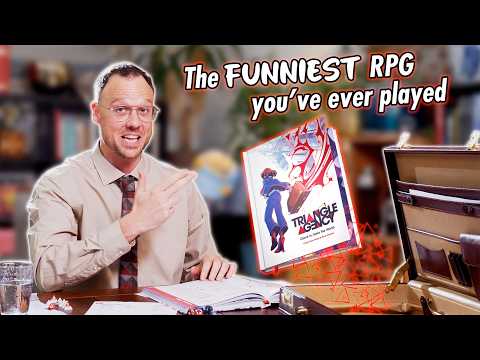Taking Criticism
Non-troversy
There was a recent “controversy” around Quinns’ review of Triangle Agency. Proponents of the game thought he just didn’t get it, and that his criticisms unfairly damaged its popularity. For some reason, Quinns thought that a game written in a consistently humorous voice was supposed to be funny, and that having unique rules for three different advancement paths (which every player can choose from) made the game difficult to run. CRAZY.
Obviously, given the sarcasm, I don’t really get the issues. Most of his review was glowing. Even in his negative opinions, he was love-bombing every part of TA. His criticisms actually convinced me there were certain players who would love this game, and who might even help run it by knowing their unique rules inside and out. Like every one of his reviews, Quinns gave the game a fair shake. It just wasn’t really for him.
What has really captured my attention in all this is the entitlement from TA’s fans. They seemed to demand a perfect 10/10 review and treat anything less as a disservice. It seems that in the very limited space of TTRPG criticism, people only want criticism to promote—a kind of ad by proxy. There’s a lot about this that rubs me the wrong way, and I hope I can express it clearly.
In Defence of Criticism
Firstly, criticism is fun. Especially harsh criticism. Insults are fun to write, fun to read, and—if done right—sometimes even fun for the recipient. If you want to get overly philosophical about it, friendly jabs are a key part of social cohesion. They’re the cup-check for your ego. Being able to take a joke at your expense is a part of emotional maturity. This is why comedians often start with a self-deprecating joke: to set the audience at ease by showing they’re not above criticism.
Good criticism also helps people identify their own displeasure. Not everyone can pinpoint why they don’t like a game. Ask anyone why they dislike Monopoly and you’ll usually hear some version of, “I always lose.” The real issue is that Monopoly doesn’t let you recover—once you start losing, you can’t really stop. Most people can’t articulate that kind of design flaw because they haven’t played enough games and don’t know the language. A critic can help identify that.
From a creator’s point of view, this is also valuable. Sure, it can sting, but often you’re too close to your own work to see its flaws clearly. Having someone point out exactly what’s wrong is a huge boon and often hard to come by. You can show what you’ve made to every person you know and only hear “cool.” A knowledgeable critic who can tell you what’s wrong is worth their weight in gold.
In Defence of the New
Of course, there’s a part of the complaints about Quinns’ review I understand. Quinns has far more reach than the creators of TA. A bad review from him could cut the game down before it gets a chance, so every slight is perceived as bigger than it is. That sensitivity comes from loving something new in a space that hasn’t strayed far from the old.
The real issue is that video TTRPG criticism has a singular voice, and that voice is Quinns—a man with his own tastes, informed by many years of gaming. Instead of demanding that he understand your game and give it the hearty recommendation you think it deserves, you should do it. You’re the one who understands it, so you should sell me on it.
We all remember Ego’s monologue from the end of Ratatouille (and if you don’t, go watch it). The hardest thing a critic can do is defend the new—to be a tastemaker. On that front, Quinns is already unimpeachable; his body of work is packed with him going out on a limb for something new. Triangle Agency just wasn’t quite right for him. Instead of kvetching about your beloved game, pick up a microphone and make it known. More voices means more points of view, which means more games finding their audience.
It also means that poor bastard Quinns can stop worrying about the unintended influence of his voice and just stick to making good videos. I’m sure he’d appreciate that.
